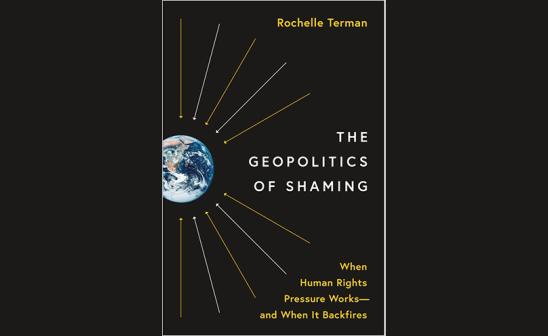Politics play a role in the efficacy of international shaming for improving human rights

A new book explores why governments shame others, when it works, and why it can backfire.
By Sarah Steimer
The decision by the international community to shame a state for its human rights violations — and whether those efforts are successful — is the focus of a new book by Rochelle Layla Terman, an assistant professor in the Department of Political Science. In The Geopolitics of Shaming: When Human Rights Pressure Works—and When It Backfires,Terman finds that the politicization of shaming is essential to the success of global human rights efforts.
“What my research tries to do is to challenge conventional wisdom by saying, okay, shaming can work in some cases,” she says. “But in other cases, it fails to induce compliance and, not only that, but it could incite a backlash by provoking resistance and even worsening human rights practices.”
Terman’s experience with human rights programs began during her undergraduate years at UChicago, when she was involved in the Human Rights Program, now the Pozen Family Center for Human Rights, and participated in their human rights internship program. She continued to work for the organization through the Dr. Aizik Wolf Post-Baccalaureate Fellowship. While working for human rights organizations, Terman says they often used shaming as a tactic when responding to human rights abuses within their portfolio of interests, but they also recognized that Western pressure was less helpful and even counterproductive in some circumstances.
When in graduate school at the University of California at Berkeley, she noticed how the scholarly literature on human rights advocacy focused on the success of “naming and shaming” — which didn't fully match up with her experience. This inconsistency, Terman says, is what motivated her to write a dissertation on the topic, which then became the basis for The Geopolitics of Shaming.
In the international community — encompassing human rights organizations like Amnesty International or Human Rights Watch; international organizations like the United Nations; as well as countries or states — the concept of shaming is defined as exerting moral, rhetorical pressure on countries that violate human rights. This can include, for example, when Amnesty International asks for signatures on a petition on behalf of a political prisoner; when the United Nations sets out a resolution condemning a nation; or when the United States government releases a statement that it opposes another certain practice by another government.
“In some of the canonical studies of the topic, the consensus in many areas of international relations has been that shaming is really one of the best tools that we have to combat human rights violations in the international arena,” Terman says. “We can't issue a citation like we can with violations in the domestic sphere. But what we can do is to issue rhetorical condemnation, use moral leverage, or shame a country for their human rights violations. And the idea is that shaming isolates a government from the international community, it embarrasses its leaders, which then incentivizes governments to comply with human rights norms and human rights treaties in order to maintain legitimacy.”
In her book — which focuses specifically on when governments shame other governments — she sought to answer two questions: When does state-to-state shaming lead to an improvement in human rights conditions and when does it backfire? And why and how do states decide to shame other states in the first place.
The effects of shaming, she says, are conditional on the relationship between the source and the target. Terman explains that states will shame their geopolitical friends in a very different way than their political allies, and will largely be reluctant to shame their friends and allies because of how it could potentially undermine their strategic relationship. On the flip side, governments are more incentivized to shame their geopolitical adversaries.
But even in shaming adversaries, there can be blowback: It can spark a nationalist reaction and resentment toward the government telling a foreign state what to do. In light of that reaction, leaders are actually rewarded for standing up to international pressure and defending their nation against perceived domination
On the other hand, shaming by a friendly nation can serve as a credible signal, reflecting to the world that something really wrong is happening. Shaming an ally is a more credible signal, and they're more likely to take that criticism seriously in order to maintain the valuable relationship, Terman says.
“The preexisting geopolitical relationship has a big effect on both the kinds of recommendations that states offer, as well as how the state under review responds to those recommendations,” Terman says. She gives the example of the United Nations’ Universal Periodic Review, a mechanism of the Human Rights Council under which member states receive a periodic examination of their human rights performance. “Take Saudi Arabia and Iran, which are pretty similar countries in many respects, and both are egregious human rights abusers. The United States speaks very differently in the Universal Periodic Review and offers very different kinds of recommendations to Saudi Arabia than it does to Iran.”
The recommendations that it offers to Iran are more severe, she explains. The U.S. may phrase a suggestion to Saudi Arabia as they should “consider” passing a law to give religious minorities rights; but with Iran, they may say “immediately do this.” A country could receive two basically identical recommendations, but they’re more likely to accept one from a geopolitical ally than an adversary. Because these reviews are public, Terman says researchers can use rigorous statistical methods to isolate the effect of geopolitical relationships on this kind of behavior.
As for why a government would choose to shame another, The Geopolitics of Shaming offers three core reasons. The first is simply because they care a lot about human rights and they want to incentivize certain behaviors. The second reason is to collect social rewards from other audiences, such as their own domestic population that wants to see human rights protected abroad. The last reason Terman identifies is to stigmatize the target country and to inflict political damage and degrade its status on the world stage.
Terman is careful to note that her book isn’t saying that shaming is either good or bad, but that it’s an exploration of shaming as a political tool in all circumstances.
“We really need to think about it from a case-by-case basis and in what particular context is shaming going to be helpful?” she says.
She identifies takeaways from her book for different groups: For NGOs, instead of shaming a country directly, it might be more helpful to try to pressure that country's allies. For scholars, she’s suggesting an update to human rights theories. And for policymakers, Terman says many already actually have a keen intuition regarding some of the political dynamics within shaming.
“Sometimes, in the interests of the American public, we might need to recognize that even though we want the United States to shame Iran very harshly, for example, that it may not necessarily be effective,” she says. “Private diplomacy might even be more effective, even if it's more subtle.”
 THE UNIVERSITY OF CHICAGO
THE UNIVERSITY OF CHICAGO


